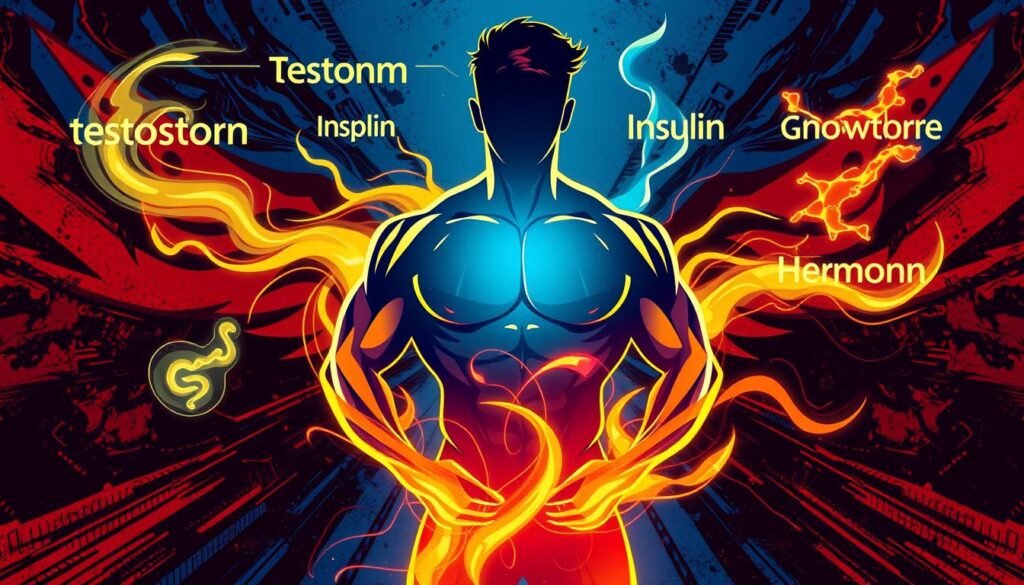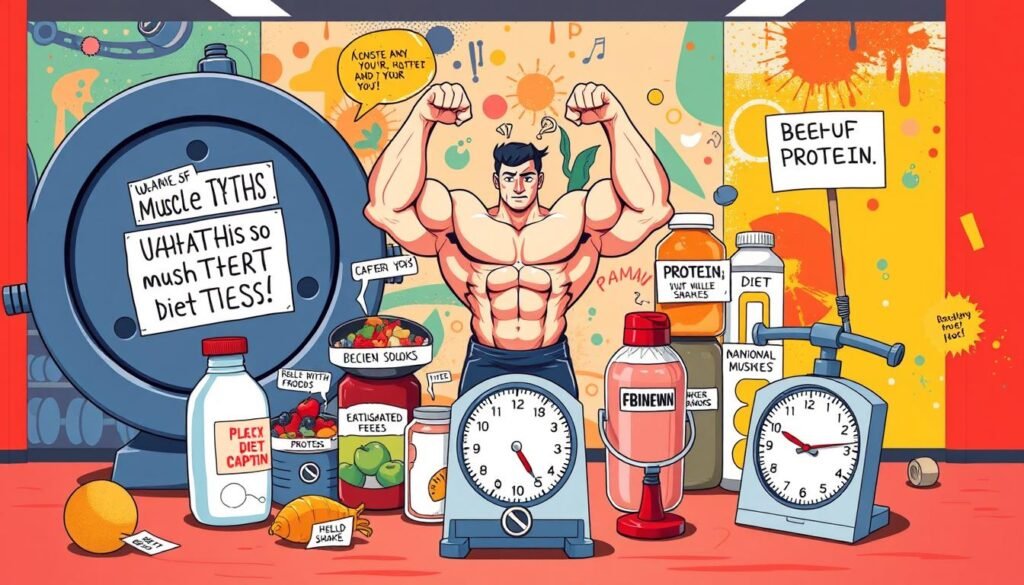Have you ever thought about what makes muscles grow and bulk up? It’s a common question, not just for athletes. Everyone interested in getting fit might ask it. What causes muscles to bulk up is a mix of nutrition, exercise, hormones, and genes. In this article, we dive into these factors. We’ll see how they play a part in muscle growth, helping you make better fitness choices.
Key Takeaways
- Identifying the triggers of muscle bulking is essential for effective strength training.
- Nutrition plays a critical role in facilitating muscle growth.
- The process of muscle hypertrophy involves various physiological changes.
- Hormones significantly impact muscle growth and recovery.
- Understanding recovery and rest is key to maximizing muscle development.
- Progressive overload is necessary to maintain continuous muscle growth.
- Genetic factors can influence individual variability in muscle gain.
For in-depth details on muscle growth, visit this complete guide about muscle hypertrophy and what causes it.
Introduction to Muscle Growth
Muscle growth is key in fitness and bodybuilding. It revolves around how muscles respond to exercise. Specifically, how muscle fibers change when you exercise regularly. This change leads to muscles getting bigger and stronger.
Eating right and resting well are crucial too. Eating enough protein helps with Muscle Development by providing what muscles need to grow. Also, hormones like testosterone play a big part in getting muscles bigger during bulking.
Rest is super important as well. Muscles need to recover to grow bigger. Knowing about the importance of exercise, food, and rest can help you improve your muscle growth.
If you want to learn more, check out this article. It gives more details on bulking up and doing it safely.
| Factor | Influence on Muscle Growth |
|---|---|
| Resistance Training | Stimulates muscle fibers to adapt and grow. |
| Nutrition | Provides essential nutrients required for repair and growth. |
| Hormones | Enhance muscle repair and growth processes. |
| Recovery | Allows muscles to repair and adapt to training. |
What Triggers Muscle Bulking
Understanding how muscle bulking works is key for improving your workout plan. Strength training and eating more calories are vital. They help grow muscles and set the stage for muscle increase.
The Role of Strength Training
Strength training is essential for muscle growth. Lifting weights and other resistance exercises engage muscle fibers. This leads to small tears in the muscle. The body then repairs these tears, causing muscle growth and enlarging muscle size over time. The effort and regularity of your strength training impact how quickly muscles develop. It’s crucial for boosting your physical look.
Importance of Caloric Surplus
Having more calories than you burn is crucial for gaining muscle. To build muscle, you need to eat more. This extra energy helps your body fix and grow muscles after hard workouts. Eating the right amount of calories helps the body build more muscle efficiently.
Understanding Muscle Hypertrophy
Muscle hypertrophy is key for building muscles. It includes different types and processes that help in muscle growth. This part talks about the various kinds of muscle hypertrophy and how it happens. It shows ways to train effectively.
Types of Muscle Hypertrophy
There are two main kinds of muscle growth: myofibrillar and sarcoplasmic hypertrophy. Each one works on the body in unique ways.
- Myofibrillar Hypertrophy: This type makes muscle fibers denser. It greatly boosts muscle strength.
- Sarcoplasmic Hypertrophy: This type increases sarcoplasm volume, leading to better endurance and bigger muscles.
How Muscle Hypertrophy Occurs
The process of muscle growth involves several changes. Initially, resistance training causes small tears in muscle fibers. This makes the body respond by:
- Repairing damaged fibers: The body repairs and strengthens muscle fibers using amino acids.
- Increasing muscle protein synthesis: After strength training, protein building in muscles increases.
- Hormonal response: Hormones like testosterone and growth hormone play a huge part in muscle growth.
Understanding the types of Muscle Hypertrophy is crucial for making good workout plans. Knowing how muscle growth works allows people to adjust their training for the best results.
The Significance of Protein Intake
Protein is key for growing muscles. It helps fix and grow tissue. It’s vital for improving fitness and reaching muscle goals. To grow muscles well, knowing how much protein you need is important. This depends on your weight and how active you are.
Recommended Protein Levels for Muscle Growth
Active people should get 1.2 to 2.2 grams of protein per kilogram of their weight daily. The right amount can change based on your fitness goals and how intense your workouts are. For example:
| Activity Level | Protein Intake (grams/kg) |
|---|---|
| Sedentary | 0.8 |
| Lightly Active | 1.0 – 1.2 |
| Active | 1.2 – 1.6 |
| High-Intensity Training | 1.6 – 2.2 |
Taking protein at the right time can boost muscle growth. Eating protein-rich foods before or after working out helps with recovery and muscle gains.
Sources of High-Quality Protein
Adding different good protein sources to your meals helps meet your needs. Think about these options:
- Lean meats (chicken, turkey, lean beef)
- Fish (salmon, tuna, mackerel)
- Dairy products (Greek yogurt, cottage cheese, milk)
- Legumes (lentils, chickpeas, black beans)
- Plant-based options (quinoa, tofu, edamame)
Choosing these good protein sources is key for a balanced diet. This helps with muscle growth. A mix of proteins aids recovery and boosts health and wellness.
Resistance Exercise and Its Impact
Resistance exercise is crucial for building muscle. It greatly helps muscle growth. By doing weight lifting and body-weight exercises, muscles get bigger and stronger. These workouts challenge the muscles, making the body grow stronger in response.
Resistance training brings both immediate and long-term changes. In the beginning, it makes muscles work harder. With time, the body gets stronger and muscles grow. This shows why using different resistance exercises is important for muscle growth.
It’s important to do compound movements like squats and deadlifts. They work multiple muscle groups at once. These exercises lead to bigger strength gains than isolation exercises, such as bicep curls. Also, it’s crucial to balance how often you exercise with rest.
- Increased muscle fiber recruitment
- Enhanced hormonal responses
- Improved neuromuscular coordination
- Greater overall strength gains
Using various resistance exercises makes your training complete. This approach helps both right away and in the long run. It makes sure your muscles grow and you get stronger constantly.
The Role of Anabolic Hormones in Muscle Growth
Anabolic hormones are key in muscle growth, enhancing physical performance. They include testosterone and growth hormone. These hormones help with muscle development and recovery after workouts. Understanding their role is crucial for building and repairing muscle effectively.
How Anabolic Hormones Promote Muscle Growth
Testosterone is the main anabolic hormone. It boosts protein synthesis, which is crucial for muscle growth. Growth hormone helps with cell regeneration and recovery after training. Both increase with intense physical activity. This is good for those who do regular strength training.
To naturally boost these hormones, consider these lifestyle choices:
- Strength Training: Diverse resistance exercises can spike hormonal levels, aiding muscle growth.
- Nutrition: Eating a diet rich in protein and healthy fats is vital. It helps maintain hormonal balance, maximizing anabolic hormone levels.
- Quality Sleep: Getting enough rest is crucial. It optimizes the hormonal environment, which supports muscle growth.

Progressive Overload: The Key to Continued Growth
Progressive overload is crucial for muscle growth and development. By making workouts harder over time, you see more muscle and strength gains. Learning how to increase workout intensity can make your fitness routine better.
Techniques for Implementing Progressive Overload
There are several ways to achieve progressive overload. These methods can lead to better muscle growth:
- Increase weights: Adding more weight to your exercises helps increase resistance and stimulates muscle growth.
- Adjust sets and repetitions: Changing the number of sets and reps can make workouts more challenging.
- Alter workout intensity: Using techniques like supersets or drop sets can make your training tougher.
- Incorporate periodization: Changing your training routine over time helps with recovery and getting stronger.
Benefits of Progressive Overload on Muscle Bulking
Using progressive overload regularly has big benefits. It leads to:
- More muscle mass and strength
- Better performance in sports and activities
- Greater endurance and stamina
To sum it up, using good techniques for muscle growth through progressive overload can really push your fitness forward. Adding different exercises to your routine can bring better results. For more info, check out more on progressive overload training.
Recovery Time: Why It Matters
It’s important to know how vital recovery time is for muscle growth. Rest is essential in an effective training plan. It lets the body fix itself and boosts both physical and mental health.
The Importance of Rest and Recovery
Muscles grow during rest, not just while exercising. Strenuous workouts cause tiny tears in muscles. Recovery fixes these tears, making muscles stronger. Ignoring rest can lead to overtraining, injuries, and poor performance.
- Rest days prevent burnout and improve motivation.
- Structured recovery promotes better performance during subsequent workouts.
- Sufficient sleep enhances hormonal balance, critical for muscle growth.
How Recovery Affects Muscle Growth
Recovery time is when muscles repair, refill energy, and build protein. These steps are key to growing muscles. Using active recovery, like light cardio or stretching, helps a lot. Not doing these can slow down muscle building.
| Recovery Method | Description | Impact on Muscle Growth |
|---|---|---|
| Sleep | Essential for hormonal regulation and muscle repair | Directly enhances recovery and protein synthesis |
| Active Recovery | Light activities that promote blood flow | Reduces soreness and enhances nutrient delivery |
| Hydration | Maintaining fluid balance | Supports metabolic processes and performance |

Genetic Factors Influencing Muscle Growth
Genetic factors play a big role in how we gain muscle. Each person has unique genetic traits. These traits affect how our bodies react to exercise and what we eat. Knowing about these factors can help us get the most out of our muscle growth.
How Genetics Play a Role in Muscle Gain
Many genetic factors affect our ability to build muscle. These factors include:
- Muscle fiber type distribution: Some have more fast-twitch fibers, aiding in muscle gain. Others have many slow-twitch fibers.
- Hormonal responses: Genetics also play a part in how much growth hormones, like testosterone, our bodies make.
- Metabolic rates: Your metabolism, shaped by genes, affects how you use nutrients for muscle building.
Understanding Individual Variability in Muscle Development
People grow muscles differently due to their genetic makeup. For example:
- Some folks gain muscle easily with little training. Others need a lot of workouts to see changes.
- Genetics can determine how fast we recover after exercise. This affects how soon we can train again.
- By realizing these different responses, we can create custom workout and diet plans. This helps everyone maximize their muscle growth.
Common Myths About Muscle Bulking
There are many myths about muscle bulking that can mislead people. It’s important to know the truth to gain muscle properly. A common myth is that eating a lot more calories is necessary. But in reality, just eating a bit more and lifting weights works better than eating too much.
Some think that women will get very bulky if they lift weights. But due to men and women being different physically, this is unlikely. When women do strength training, they usually get toned and defined muscles, not bulkiness.
There’s also a belief that all weight gained from bulking is muscle. But often, weight gain includes fat, not just muscle. It’s vital to focus on what your body is made of, not just weight.
Knowing the truth helps clear up myths about growing muscles and setting real goals. Understanding these myths about bulking lets people plan their fitness better.
| Myth | Truth |
|---|---|
| Excessive caloric surplus is necessary for muscle growth. | A moderate caloric surplus, combined with effective training, is generally more beneficial. |
| Women will become bulky from weight training. | Women often gain strength without significant bulk due to hormonal differences. |
| All weight gained equals muscle. | Weight gain can include both muscle and fat; body composition matters. |

Conclusion
Muscle bulking is complex. It needs an understanding of many factors that impact muscle growth. We looked at the role of strength training, the right nutrition, hormones, and genes. Each plays a key part in growing muscles. This helps people make smart choices to better their bulking efforts.
It’s also key to ignore myths about muscle bulking that can lead people astray. Knowing about progressive overload and the need for rest is important. The Summary of Muscle Bulking Factors shows how staying consistent and taking a whole approach is vital for muscle goals.
Making choices based on science and real-life use is key for success. Starting on muscle growth, taking a full view can truly better efforts. This supports lasting and meaningful gains in muscle bulking.